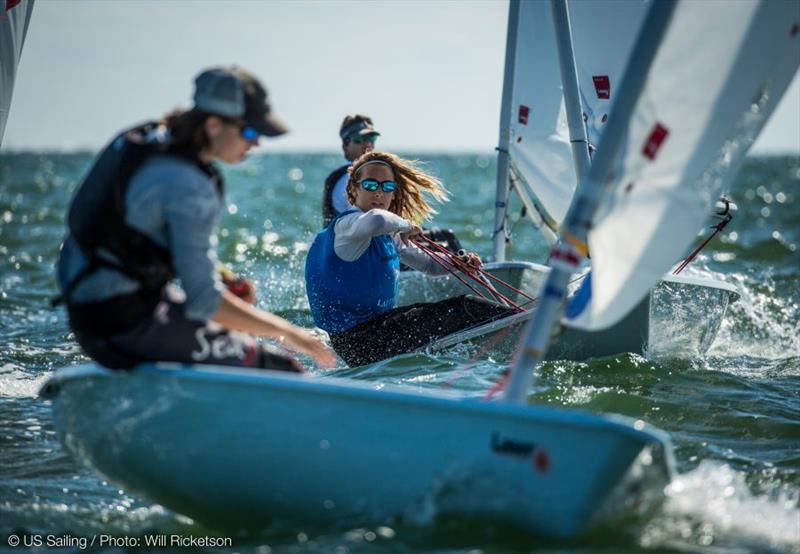
Reviving your Regional Youth Racing
by Andrew Nelson 13 Dec 2017 16:04 GMT

Youth Laser Radial sailors © Will Ricketson / US Sailing
Andrew Nelson, Youth Sailing Director at The Sailing Foundation in Redmond, Washington, has found success in revitalizing regular youth racing in the Pacific Northwest. Here he shares some lessons and practical advice for others looking to grow the sport in their area.
In fall of 2014, I began managing the Northwest Youth Racing Circuit, which is a collection of seven summer regattas in Washington and Oregon. At that time, the NWYRC had just finished another underwhelming year. Many regattas were sparsely attended and fleet sizes were routinely in the single digits. This was true even among popular youth classes like the Opti.
It had gotten to the point that only two or three teams were regularly participating in the series. Before this decline, the NWYRC had produced talented sailors like U.S. Olympian Helena Scutt and U.S. Singlehanded Champions Hanne Weaver and Derick Vranizan, to name a few. After leaving our circuit, these sailors all went on to have success at the national and international level, but not without first doing time in the back half of their local fleet.
Since 2014, we've nearly doubled NWYRC regatta attendance. Our total size this summer was over 620 sailors, with 145 sailors participating in our summer series finale. That regatta included a talented 38 boat Laser Radial fleet, which had at least a dozen skippers who were capable of winning a race. Among those racing regularly in that fleet were three top-ten finishers from the Junior Women's Singlehanded Championships, including Leiter Cup winner Abbie Carlson. There's still plenty of work to do in our region, but I believe this turnaround was at least partly attributable to the following strategies.
Grow the Middle
If we really want to push the top sailors, we need to focus our efforts on coaching those mid-fleeters and getting them out to regattas regularly. It's easy to get fixated on only working with the top sailors, but what those high-performers really need are more boats challenging them on the start line and making them pay for their mistakes on the race course. If we can elevate the caliber of the average sailor, then these local regattas will start to take on that "big regatta" feel. This better prepares our top sailors for success at the national level.
For this reason, I spend most of my time at regattas working with those mid-fleeters who come from smaller teams or who might not have a coach at all. It's also very rewarding because their improvement is more rapid and more easily observable. These mid-fleeters improve a ton simply by sailing against those top skippers, so keeping the best sailors engaged with your local series is also part of the equation.
Remember to Have Fun
This is the essence of what sailboat racing is all about, right? Sure, we want races to be well-run and safe, but that doesn't mean you can't have fun. Having an ice cream sundae bar during awards, giving out regatta pajamas instead of regatta t-shirts, providing on site camping, and letting competitors request a song for the regatta playlist (and then playing it on the water) are all examples of how hosts keep sailors (and parents) coming back.
Kids are pretty good at having fun and making friends. As adults, we sometimes need a reminder of what youth sports are all about. We've had exceptional hosts and volunteers at all of our regattas. A good host or volunteer understands the importance of a positive and welcoming regatta culture; a culture that allows for fun.
Work Together
One thing I'm very proud of is our region's spirit of cooperation. We work hard to keep regatta costs down, share coaches and coach boats, and provide charters boats when at all possible. This is especially true for development fleets like Opti Green Fleet where hosts waived the charter fee and set the entry price at $20. For those novice racers, it's literally as easy as showing up to the regatta with your PFD.
In the FJ fleet, there's lots of sharing of sailors and boats in an effort to get as many on the water as possible. This all takes plenty of coordination between coaches, parents, and hosts, but with 300 miles between our two furthest regatta venues we have to work together. There's no alternative. A self-serving attitude doesn't help our sport, and it certainly won't help increase participation or competitiveness.
About the Author:
Andrew Nelson
Youth Sailing Director
The Sailing Foundation
www.nwyouthsailing.org